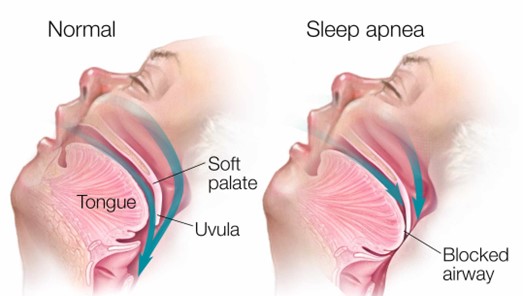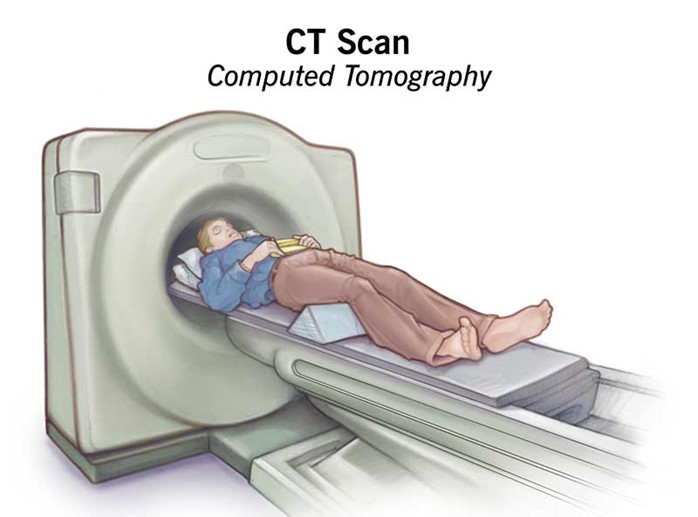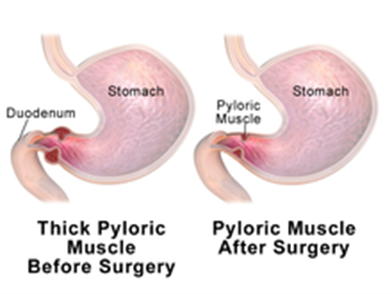A client with obstructive sleep apnea (OSA) ambulates in the hallway with the nurse prior to bedtime and then returns to bed. Which intervention is most important for the nurse to implement before leaving the client?
Apply the client's positive airway pressure device.
Elevate the head of the bed to a 45 degree angle.
Remove dentures or other oral appliances.
Lift and lock the side rails in place.
The Correct Answer is A
Choice B reason: Elevating the head of the bed to a 45-degree angle is not a sufficient intervention for the nurse to implement before leaving the client. Elevating the head of the bed can help reduce snoring and improve breathing by preventing the tongue and soft palate from falling back and obstructing the airway. However, it may not be enough to prevent apnea episodes in clients with obstructive sleep apnea, especially if they have other risk factors such as obesity, enlarged tonsils, or nasal congestion. The nurse should also use other interventions such as a positive airway pressure device, weight loss, or surgery.
Choice C reason: Removing dentures or other oral appliances is not a relevant intervention for the nurse to implement before leaving the client. Dentures or other oral appliances are devices that replace missing teeth or improve dental alignment. They may help improve speech, chewing, and appearance, but they do not have a direct impact on obstructive sleep apnea. The nurse should instruct the client to remove dentures or other oral appliances before going to bed to prevent discomfort, infection, or damage.
Choice D reason: Lifting and locking the side rails in place is not a necessary intervention for the nurse to implement before leaving the client. Side rails are bars that attach to the sides of the bed frame to prevent falls or injuries. They may provide safety and security for some clients, but they may also pose risks such as entrapment, strangulation, or agitation. The nurse should assess the need for side rails on an individual basis and consider alternative measures such as bed alarms, low beds, or floor mats.

Nursing Test Bank
Naxlex Comprehensive Predictor Exams
Related Questions
Correct Answer is D
Explanation
Choice A: Securing chest tube to the stretcher for transport is a good practice, but it is not the most important action. The chest tube should be secured to prevent accidental dislodgement or kinking, but it does not affect the function of the chest tube or the drainage system.
Choice B: Administering PRN pain medication prior to transport is a compassionate action, but it is not the most important action. The client may experience pain due to the chest tube, the intubation, or the underlying condition, but pain relief is not a priority over maintaining adequate ventilation and drainage.
Choice C: Marking the amount of chest drainage on the container is a useful action, but it is not the most important action. The amount of chest drainage should be recorded and reported to monitor the client's status and detect any complications, such as hemorrhage or infection, but it does not affect the immediate function of the chest tube or the drainage system.
Choice D: Keeping the chest tube container below the site of insertion is the most important action for the nurse to take. The chest tube container should be kept below the level of the client's chest to maintain a gravity-dependent pressure gradient that allows air and fluid to drain from the pleural space. If the container is raised above the site of insertion, it can cause backflow of air or fluid into the pleural space, which can compromise ventilation and cause tension pneumothorax.

Correct Answer is B
Explanation
Choice A reason: Marking an outline of the "olive-shaped" mass in the right epigastric area is not a priority nursing action. The mass is caused by hypertrophy of the pyloric sphincter, which obstructs gastric emptying and causes projectile vomiting. The mass may not be palpable in all cases.
Choice C reason: Monitoring amount of intake and infant's response to feedings is important, but not the highest priority. The infant may have difficulty feeding due to nausea, vomiting, and abdominal pain.
Choice D reason: Instructing parents regarding care of the incisional area is a post-operative nursing action, not a pre-operative one. The parents will need to learn how to keep the incision clean and dry, monitor for signs of infection, and administer pain medication as prescribed.

Whether you are a student looking to ace your exams or a practicing nurse seeking to enhance your expertise , our nursing education contents will empower you with the confidence and competence to make a difference in the lives of patients and become a respected leader in the healthcare field.
Visit Naxlex, invest in your future and unlock endless possibilities with our unparalleled nursing education contents today
Report Wrong Answer on the Current Question
Do you disagree with the answer? If yes, what is your expected answer? Explain.
Kindly be descriptive with the issue you are facing.
